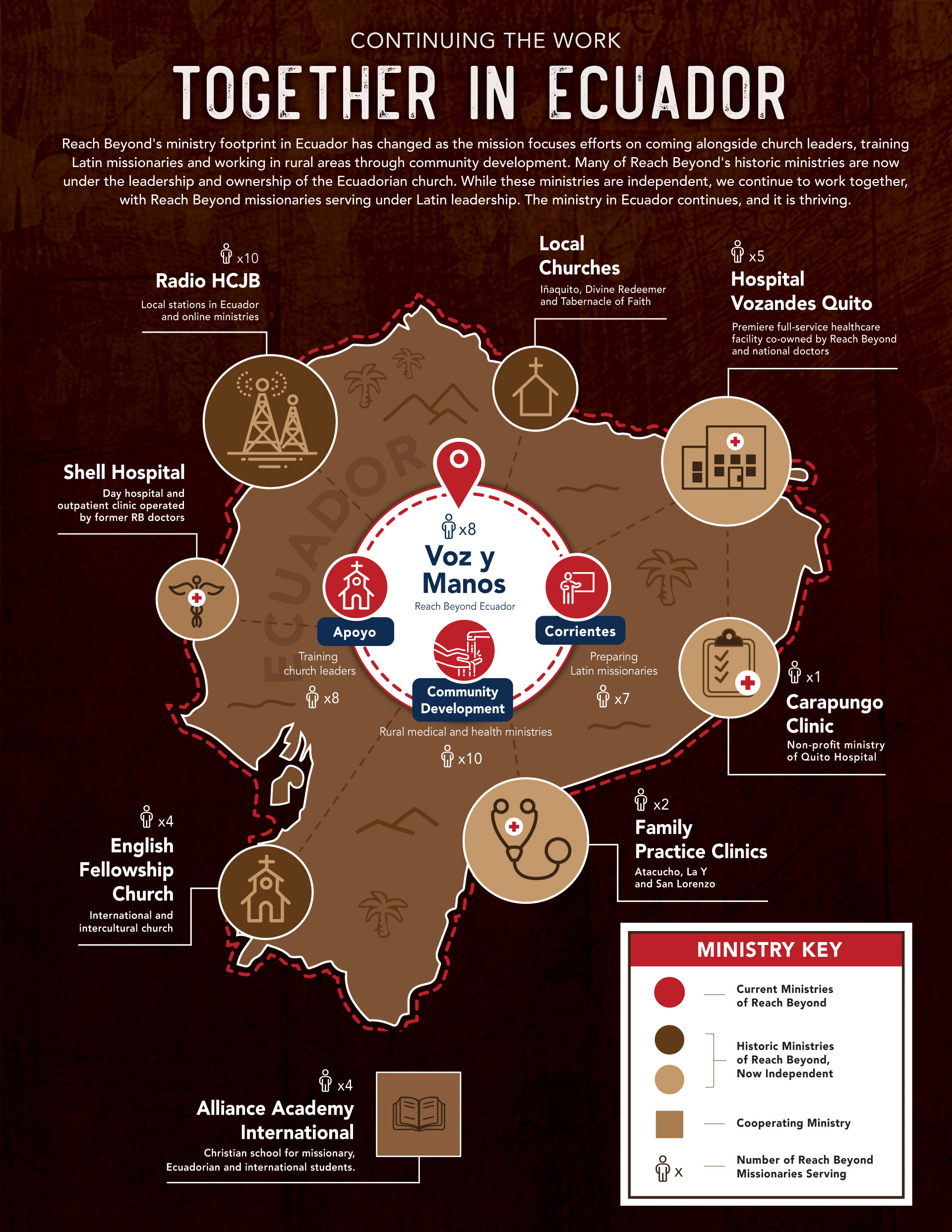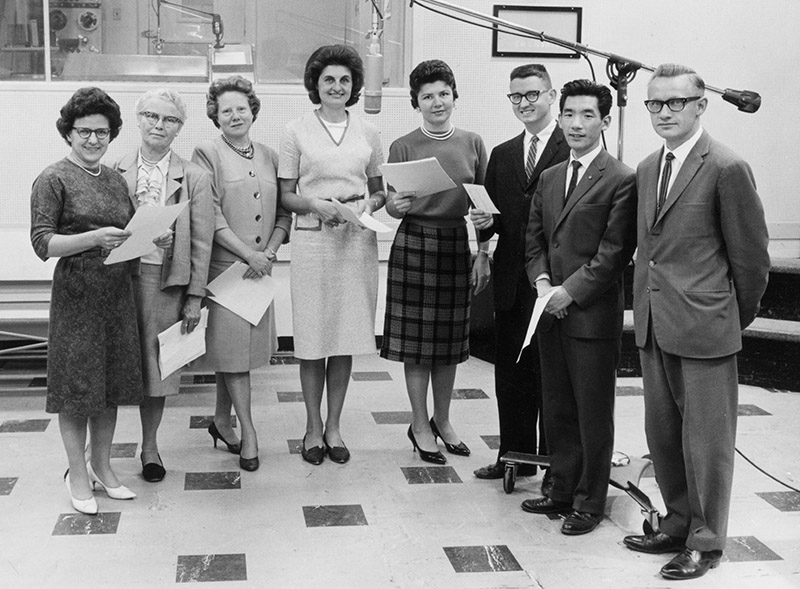 |
|
For more than 75 years, HCJB - The Voice of the Andes, was an international shortwave station with broadcasts in many of the world's major languages. |
ECUADOR
Ecuador is where it all began for Reach Beyond. That's where the ministry started. That's where the ministry grew. And that's where the worldwide impact began to be felt. Over the years, hundreds of missionaries have been sent to Ecuador to serve in and support media, healthcare, and discipleship ministries. Some of them spent their entire ministry in the country proclaiming and demonstrating the Good News as the church grew. Others spent time in Ecuador learning the necessary skills and tools that would eventually lead them to fruitful ministry in other unreached parts of the world. And some are working in Ecuador now, even as missionary efforts largely transition from evangelism to empowering the local church and mobilization.
When Clarence Jones started missionary radio station HCJB in Ecuador in 1931 to reach the world, there were few evangelical Christians in the country, and even fewer radios. Ninety years later, the country looks quite different. Ecuador’s government has invested heavily in infrastructure, and the economy has grown. The city of Quito has also grown from a population of perhaps 60,000 people in 1931, to nearly 1.9 million people today.
Reach Beyond’s footprint and ownership of ministries has drastically changed in Ecuador over the past 30 years as the mission refocused its efforts towards partnering with local believers around the world to plant radio stations. The goal was to provide everyone with the opportunity to hear the Gospel in a language they could understand. We also wanted to empower local partners to use “hands” strategies of medicine and community development to demonstrate the Gospel in their own communities.
The mission also believed that the Ecuadorian church was ready and able to assume the leadership, responsibility, and ownership of many of its ministries to Ecuador.
Today radio station HCJB is thriving on its own. HCJB continues to be a well-respected and well-known source of information and inspiration throughout Ecuador and the Spanish speaking world, thanks to its social media and online outreach.
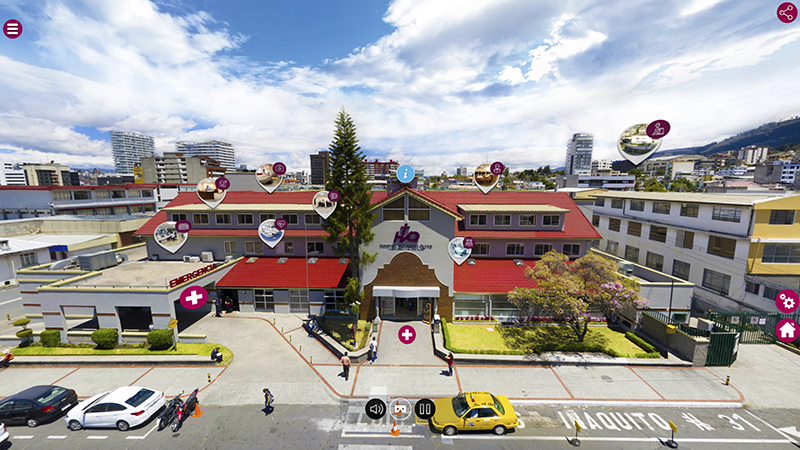 |
|
Hospital Vozandes Quito opened its doors in 1955 "To the glory of God, and the service of Ecuador." That founding purpose continues today as the hospital, now an independent ministry, transitions towards total local ownership. |
Hospital Vozandes is made up of national physicians reporting to a national board and continues its legacy as a place where Ecuadorians can get the best spiritual care, as well as physical care. Most of the mission’s former medical clinics, as well as the Shell hospital, are now owned and run by believers or Christian foundations, who continue to demonstrate the Gospel through compassionate care.
The biggest change in Ecuador, however, is the local church. In 1931, there was one church in Quito, and it had less than a dozen Ecuadorian believers. A country that was once considered unreached, has seen God at work in a powerful way. There are now more than 600 churches in Quito and over 15% of all Ecuadorians are evangelical Christians. The Ecuadorian church is thriving, and God is calling Latins to global missions.
All these changes raise the question of whether there is still an ongoing need for missionaries in Ecuador. Should we be investing resources in a “reached” country?
For Reach Beyond, we’ve discovered that our work in Ecuador has opened doors and opportunities for us to do ministry in other more unreached areas of the world. But that doesn’t mean our work in Ecuador stops. There is still a need for cross-cultural partnership, to learn from one another, and to disciple and model missions to the next generation.
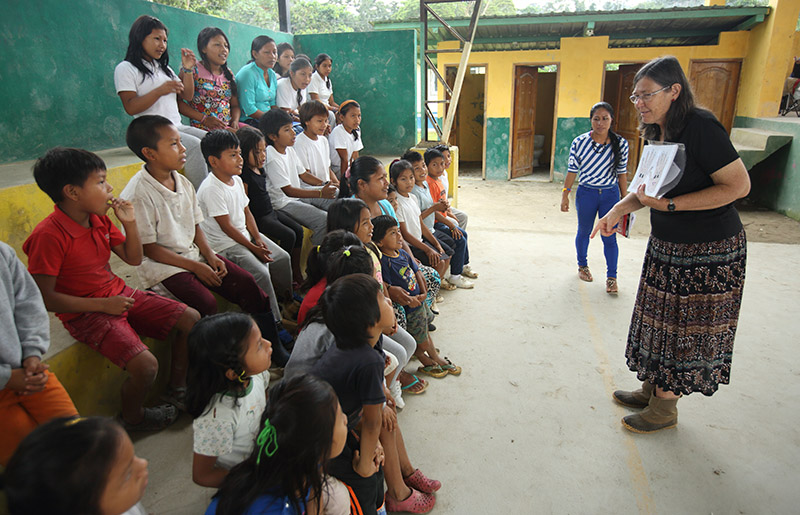 |
|
Career missionaries like Miriam Gebb continue to serve in Ecuador through community health and development. |
Gary Gardeen, a Reach Beyond missionary who went to Ecuador in 1978, is currently serving as the director of the newly formed Voz y Manos entity (Reach Beyond’s Country Office registered in Ecuador). He is also a member of Reach Beyond’s Board of Trustees and a former hospital administrator for Hospital Vozandes. He acknowledges that while God calls some people away to serve in less reached areas, He also calls some people to stay. Gary says the faithfulness of long-term missionaries is important.
“There is an encouragement that people aren’t forgotten,” says Gary. “People appreciate those who have stayed here, that have been faithful and maintain these relationships. Ecuadorians have seen our faithfulness over time. That’s a huge encouragement to church and ministry leaders.”
Those missionaries who have stayed continue to provide support, mentorship, and discipleship. Rather than running ministries, they now work interdependently with national leadership, to continue to build and support successful ministry. They come alongside the national church and provide a model for sending cross-cultural missionaries.
And those who God called to ministry elsewhere around the globe have been able to take the lessons, skills, and relationships they developed in Ecuador to make an impact wherever God sends them.
LESSONS LEARNED FROM THE QUICHUA
Esther Neufield, a long-time Reach Beyond missionary originally from Paraguay, acknowledges that interdependence isn’t something that Western mission organizations have always done well. “Many Western missionaries came and took ownership without asking instead of working beneath local leadership from the beginning,” she explains. “But the problem is from both sides. There is a dynamic where the humility and politeness of Latin culture often defers to foreigners, especially North Americans, as if they know how to do everything better. There is an attitude of, ‘Oh, I don’t really know how to do it. Better let them do it.’ And that’s not helpful either.”
As Reach Beyond learned in Ecuador, it is important to come alongside local believers and work together in ministry. This isn’t just to empower nationals. Missionaries actually have as much to learn as they have to teach.
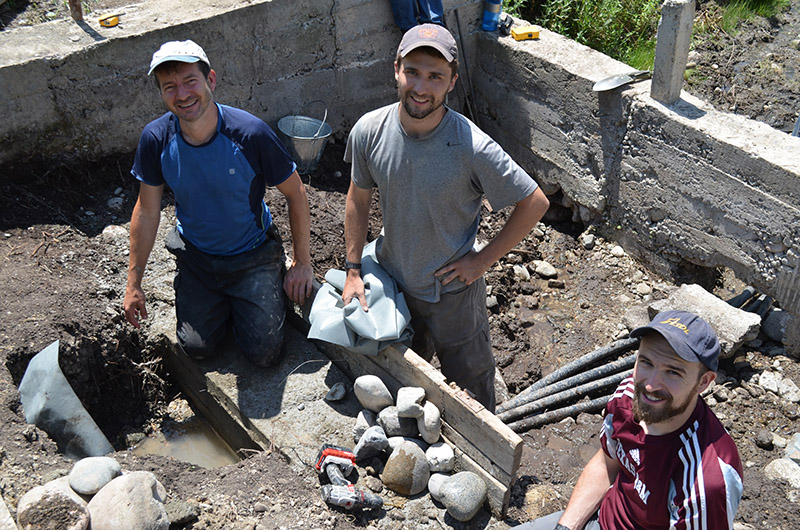 |
|
Martin uses spring capture techniques learned from Quichua teammates while serving in Ecuador, to build a clean water system in Central Asia. |
“It is really easy to fall into the mode of portraying missionaries as the experts having all the answers,” Martin Harrison says. “A true missionary goes with an open mind and open arms and can learn so much. We don’t want other nationalities dependent on us missionaries, nor independent. We were aiming for interdependence.”
Martin and Ruth Harrison, missionaries sent from the UK, were first called to serve in Ecuador in 2006. They were passionate about integrating professional skills with missionary work, and at the time, there weren’t very many mission organizations who were doing that. They started with community development projects in rural areas, including clean water installations, mobile clinics, and health and hygiene training.
After a couple of years, Martin became the Director of Community Development. He spent most of his time leading a multicultural, multilingual team, doing water projects, rural healthcare initiatives, and medical caravans. After gaining essential experience in the ministry, there was a desire to replicate it in other parts of the world, particularly among the unreached. So, the Harrisons returned to the UK and have used that as a base to go other places.
They admit they would not have had success in other unreached areas, however, if it hadn’t been for what they learned in Ecuador. Ruth explained one such example. “There is the technical work of the water projects – the surveying, putting pipes in, pumps, etc., but the actual capture of the spring – we learned that from the Quichua people in Ecuador. Our Quichua teammates always said that capturing a spring is more of an art form than an engineering feat. So, we learned that art, and we have captured multiple springs in Central Asia based on what we learned from the Quichua people. We learned a huge amount from our Quichua brothers and sisters. It was a hard-goodbye leaving Ecuador, but it was an encouragement to our Quichua friends to know we are now doing this in Central Asia.”
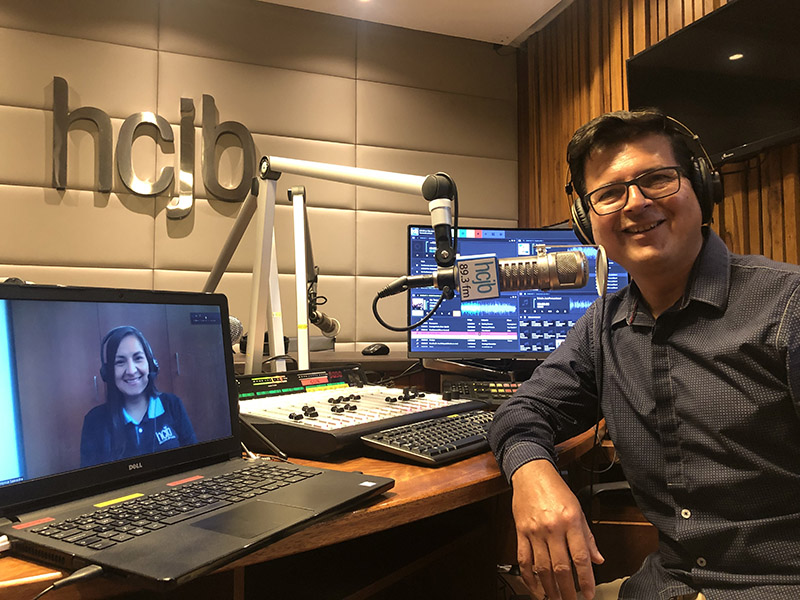 |
|
Radio HCJB is an independent Ecuadorian ministry broadcasting the Gospel throughout Ecuador, to the Spanish-speaking world online, and using social media platforms. |
HCJB LEADERSHIP
Anabella Cabezas, the current director of HCJB Radio, first interacted with the station when she was 8-years old. “There was a program for kids where you could learn about the Bible through correspondence, and you got a diploma after you completed all of the work.” she explained. “When I did that program, I never would have dreamed that I would one day be the director of HCJB!”
Twenty-years ago, Reach Beyond (then HCJB World Radio) was still broadcasting the Gospel throughout the world from its powerful shortwave ministry based in Quito. Although the broadcasts were produced in many languages, the common language for mission-wide meetings was English, making it harder for Spanish-speaking Ecuadorians to participate. And with over four hundred missionaries in Ecuador, the mission was perceived as mainly a foreign ministry, even though it was well-respected for its local work through the radio station and hospitals.
With Reach Beyond ending most of its international shortwave broadcasts out of Ecuador in 2007, Radio HCJB was redefined as a local Ecuadorian ministry reaching Latin America. While the mission had begun planning to turn the radio ministry over to local believers in the 1970’s, government regulations on transferring frequencies, as well as other setbacks made the transition to an Ecuadorian board and Ecuadorian director take much longer than planned.
Anabella has been a big part of that change at HCJB, but it didn’t happen overnight. Her first job was as a secretary in the English language department. She worked her way up through the ranks and completed her degree in administration studies. She was instrumental in helping HCJB to become a self-sustaining ministry.
“I saw that we needed to start raising funds from Ecuador to sustain the station,” she recalls. “My boss said I was free to try, but they didn’t believe the Ecuadorians and local churches were mature enough to sustain the ministry. I decided we would start it anyway.”
Anabella held a radio share-a-thon – “but we called it ‘Share the Mission’ to emphasize that we are in the ministry together.” Initially, the fundraiser had a good response, so they decided to keep it going. Now, almost 70% of the station’s income is from listener donations.
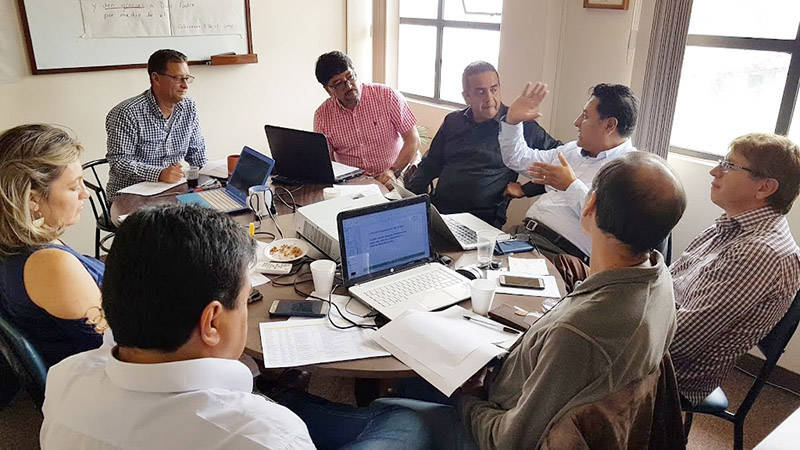 |
|
Reach Beyond's Apoyo ministry continues to mentor and train church leaders in Latin America. |
While missionaries continue to provide support and mentoring to HCJB, HCJB in turn provides support and mentoring to the local church. Anabella explains, “Pastors recognize that people come to church on Sundays to learn about God and to grow. But HCJB is with them Monday through Sunday. Through this channel, they have learned more about missions, the Word of God, about music, and even our culture.”
Reach Beyond President, Daniel Enns, knows the power that HCJB has to support the church. “HCJB has a reputation to unite leaders and draw people to their God-given callings,” he says. “They hold pastor gatherings each year. They support Apoyo, which is Reach Beyond’s discipleship program for pastors. They are leveraging their platform to speak into pastors’ lives and help have them see the bigger picture. The station tithes 10% of their donations to send missionaries. They model this for churches, so they can understand how to send missionaries.”
Not only does HCJB come alongside the church and support them financially, but they also help connect Latin missionaries to HCJB’s audience. Annabella explains, "We interviewed a young couple who are serving in Spain. During the program we asked them if they needed support, so they gave us their contact information. Several listeners responded and said they wanted to support them. We are a platform to connect people interested in missions. Our ministry has always been mission-focused.”
FROM EVANGELISM TO MOBILIZATION
Whereas most ministry in Ecuador was originally focused on evangelism, today most ministries focus on mobilization. In Latin America, young people on fire for the Gospel want to go into cross-cultural ministry. But there is still much work to do to come alongside the church and send out workers responsibly.
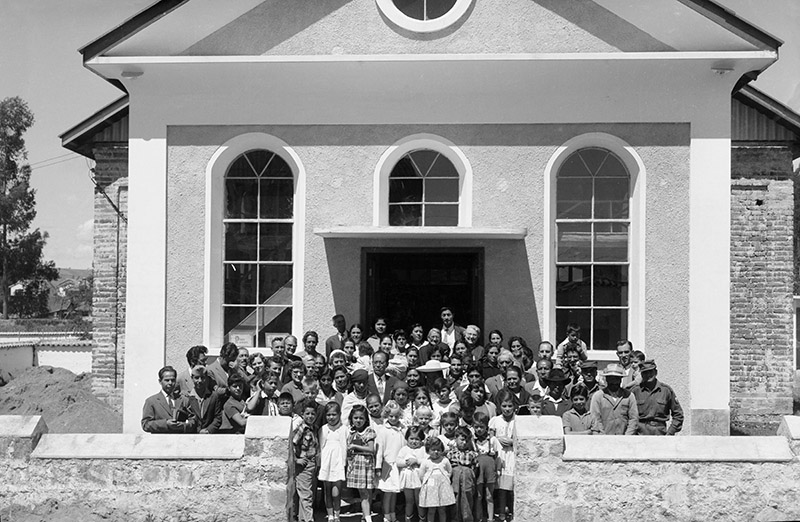 |
|
The Iñaquito Evangelical Church was started in the 1950s as a result of Reach Beyond's hospital and medical ministry. It was the third church in Quito and just one of many started throughout Ecuador by Reach Beyond's missionaries and ministries. Today there are over 600 churches in Quito and more than 15% of Ecuadorians are evangelical believers. |
“The church is in its infancy stage in terms of its responsibility to send,” says Daniel. Prior to serving as president, Daniel served in a role that studied the options for mobilizing bi-vocational missionaries among Latin American churches to reach unreached people groups. “There are individuals who have a high calling, a very trainable cultural background, capable of transitioning from Spanish to English to other languages. Unfortunately, the issue is still about sending responsibly. If the church is not ready to support missionaries, they are destined to fail. Returning failures will quench the initiative of those who are wanting to go.”
Reach Beyond’s Corrientes program, directed by Carlos Pinto, helps to answer that concern. The goal of the program is to come alongside Latin Americans interested in cross-cultural ministry and help them in their last phases before they leave for the mission field, to provide more sustainability.
Martin and Ruth were part of the team who helped launch Corrientes. One of the challenges they saw was helping the church understand the idea of incorporating profession into missions. “The thinking was that if you are a missionary, you do church work. It was interesting to see how many Latin Americans have a heart for closed (creative access) countries, and the only way they could go is through their profession. One can not get a visa as a missionary, but one can get a visa as an engineer, teacher or doctor. It was good to show them this, and they could give examples to their churches.”
The Harrisons also helped provide mentorship for cross-cultural living and how to integrate faith into profession. “The Western church has separated the two, but people need to see that you not only proclaim the message through your words, but also through your actions and your work.”
As Daniel explains, the approach in Latin America must be different than the approach in the more affluent North America. “It’s not just about money. We cannot think that if we just send the finances, then Latin America can send many missionaries. We need to come alongside and help them and the church to grow, to train and mentor them, and to share our experiences.”
It’s these shared experiences that Esther Neufield sees as her contribution to the new mobilizing ministry focus.
Esther was born and raised in Paraguay in a Christian home. Her parents were refugees from communist Russia. “Somehow, there was a very strong feeling that God saved us for something, to glorify God in South America,” Esther explains.
As a teenager, Esther gave her life to Christ and asked how she could serve Him. She decided the best way would be to become a teacher so she could teach children to love Jesus. Eventually, her home church in Paraguay sent her to the eastern Paraguayan jungle to start a mission school.
“It was a time full of excitement, where I could put all my dreams and vision into starting a school, but the surroundings weren’t that easy. Four years later, I was really tired,” Esther said. Burned out, she returned to the capital city to teach. During this season, Esther went to Europe where she attended a missions conference. It was there she realized that God had something new planned for her.
“I was attending a Trans World Radio seminar, just for fun, when all of a sudden, it struck me. The Lord wanted me in radio ministry. I was amazed, since I’d never been interested in radio ministry. But I just knew it was from the Lord.”
After volunteering for the local Christian station, Esther eventually landed in Quito, Ecuador, where her sister and brother-in-law were living and serving in HCJB’s German language department. She completed a year of volunteer work with HCJB and then raised support to stay full-time.
“I worked in radio for many years and very much enjoyed doing children’s programs. It helped me fall in love with God and Jesus, seeing them through the eyes of the children. But then, the burnout came again,” Esther recalled.
Each time, recovering from burnout was very difficult, both physically and psychologically. After a while, she returned to Quito, but this time she was invited to work in a new training program called Corrientes.
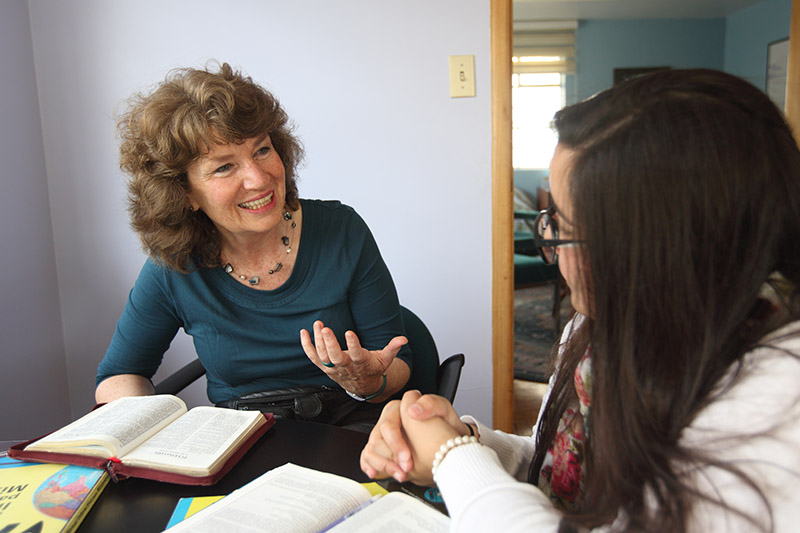 |
|
Reach Beyond missionaries have discipled many Ecuadorian believers throughout the years. Today Reach Beyond's Corrientes program is mentoring and preparing Latin American missionaries for bi-vocational ministry. |
“The attrition rate of Latin American missionaries has been very, very high. Some 70% do not make it past the first term. So, Corrientes became very precious to me, to be able to come alongside the Latin American mission movement and help them to not make the same mistakes I had made,” Esther said. She encourages women in the program to grow, to practice lifelong learning, to have healthy relationships, develop deep roots in God, have a healthy view of themselves and to learn how to resolve conflict.
When Carlos Pinto asked Esther to join the Corrientes team, she questioned his invitation. She was still feeling limited at the time, unable to work a full eight hour day. “But he helped me to see it was just that experience that qualified me. I can help others, Latin missionaries who have gone through breakdowns, or had difficult experiences or abuse, and did not feel validated. We can walk together with Jesus, to call out the lies of the enemy. Let the Lord make something beautiful out of the pain.”
She learned that it wasn’t just about having shared pain that provided support to these future missionaries. The fact that she had a missionary background provided a vital example.
“I used to wonder if Ecuador or Latin America still needed missionaries. Was I inhibiting the local movement? The church is well developed now; can’t they send on their own?” Esther questioned. “But my friends in Latin America said, ‘in our churches, we do not have people who have had missions experience. Just knowing you, that there is someone who sits and listens to our experiences and understands that is precious to us. We need somebody to listen and understand and walk with us.'”
Corrientes has been incredibly successful in its one-on-one mentoring and individualized preparation of Latin missionaries to serve in difficult places. As a result, the attrition rate for graduates of the program is virtually zero. These Latin missionaries are thriving, and God is doing incredible ministry through them.